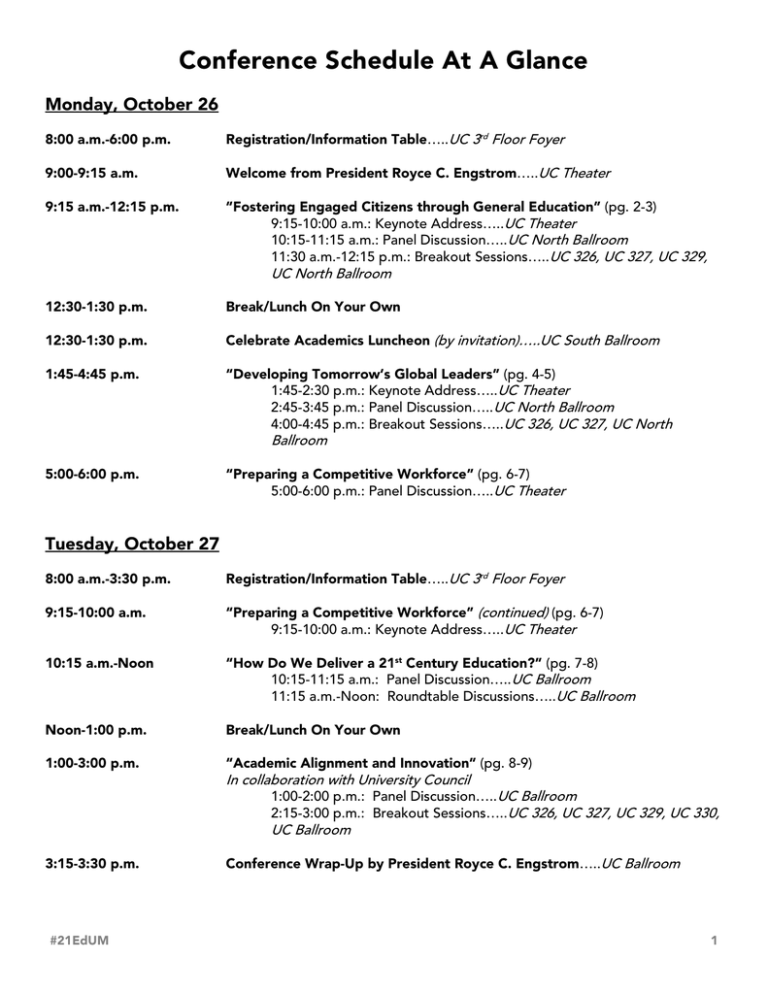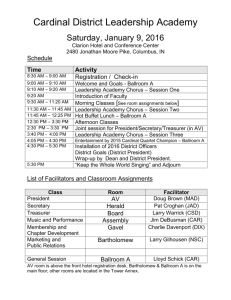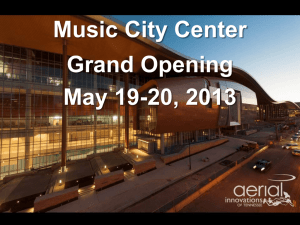Conference Schedule At A Glance Monday, October 26 UC 3
advertisement

Conference Schedule At A Glance Monday, October 26 8:00 a.m.-6:00 p.m. Registration/Information Table…..UC 3rd Floor Foyer 9:00-9:15 a.m. Welcome from President Royce C. Engstrom…..UC Theater 9:15 a.m.-12:15 p.m. “Fostering Engaged Citizens through General Education” (pg. 2-3) 9:15-10:00 a.m.: Keynote Address…..UC Theater 10:15-11:15 a.m.: Panel Discussion…..UC North Ballroom 11:30 a.m.-12:15 p.m.: Breakout Sessions…..UC 326, UC 327, UC 329, UC North Ballroom 12:30-1:30 p.m. Break/Lunch On Your Own 12:30-1:30 p.m. Celebrate Academics Luncheon (by invitation)…..UC South Ballroom 1:45-4:45 p.m. “Developing Tomorrow’s Global Leaders” (pg. 4-5) 1:45-2:30 p.m.: Keynote Address…..UC Theater 2:45-3:45 p.m.: Panel Discussion…..UC North Ballroom 4:00-4:45 p.m.: Breakout Sessions…..UC 326, UC 327, UC North Ballroom 5:00-6:00 p.m. “Preparing a Competitive Workforce” (pg. 6-7) 5:00-6:00 p.m.: Panel Discussion…..UC Theater Tuesday, October 27 8:00 a.m.-3:30 p.m. Registration/Information Table…..UC 3rd Floor Foyer 9:15-10:00 a.m. “Preparing a Competitive Workforce” (continued) (pg. 6-7) 9:15-10:00 a.m.: Keynote Address…..UC Theater 10:15 a.m.-Noon “How Do We Deliver a 21st Century Education?” (pg. 7-8) 10:15-11:15 a.m.: Panel Discussion…..UC Ballroom 11:15 a.m.-Noon: Roundtable Discussions…..UC Ballroom Noon-1:00 p.m. Break/Lunch On Your Own 1:00-3:00 p.m. “Academic Alignment and Innovation” (pg. 8-9) In collaboration with University Council 1:00-2:00 p.m.: Panel Discussion…..UC Ballroom 2:15-3:00 p.m.: Breakout Sessions…..UC 326, UC 327, UC 329, UC 330, UC Ballroom 3:15-3:30 p.m. #21EdUM Conference Wrap-Up by President Royce C. Engstrom…..UC Ballroom 1 Day One – Monday, October 26 8:00 a.m.-6:00 p.m. Registration/Information Table UC 3rd Floor Foyer 9:00-9:15 a.m. Welcome from President Royce C. Engstrom UC Theater 9:15 a.m.-12:15 p.m. “Fostering Engaged Citizens through General Education” Overview This session will explore innovative efforts in higher education to prepare engaged citizens. Discussion will focus on how general education at UM could be enhanced, and the processes by which we could facilitate these enhancements. What is the role of general education, or a liberal education, in today’s society? How could general education at UM be enhanced, and what can we do to develop a more effective general education program? Keynote Address 9:15-10:00 a.m. in the UC Theater Introduction by Royce C. Engstrom, President “Fostering Engaged Citizenship and Professional Success: The Role of General Education” by Debra Humphreys, Vice President for Policy and Public Engagement, Association of American Colleges & Universities Setting a broad context for the conference, Debra Humphreys will present a vision for quality liberal education in the 21st century. Within the framework of AAC&U's Liberal Education and America's Promise (LEAP) initiative, she will discuss the changing economy and societal challenges that present an urgent need to prepare all college students with liberal education outcomes. She will also highlight how colleges and universities are changing the designs of general education to ensure that all students are prepared for a lifetime of success in work and in life. Panel Discussion 10:15-11:15 a.m. in the UC North Ballroom Panelists • Anthony Johnstone, Associate Professor, Alexander Blewett III School of Law • Nate McCrady, Associate Professor, College of Humanities and Sciences • Kim Reiser, Associate Professor, Missoula College; Chair of UM General Education Committee • Rob Tuck, Assistant Professor, College of Humanities and Sciences • Nadia White, Associate Professor, School of Journalism • Tobin Shearer, Associate Professor, College of Humanities and Sciences (Moderator) #21EdUM 2 Questions • What can we do in higher education to foster more informed and engaged citizens? • What is the role of general education or a liberal education in today’s society? • What do you see as the strengths and weaknesses of general education at UM? • How would you describe an ideal general education program? • What are the processes by which we can facilitate general education enhancements? Breakout Sessions 11:30 a.m.-12:15 p.m. in UC 326, UC 327, UC 329, UC North Ballroom General Education for the 21st Century (Daisy Rooks and Brock Tessman, Moderators); UC North Ballroom and UC 326 • What types of general education or liberal education requirements are relevant to the 21st century (that will produce informed and engaged citizens)? • How do we develop a greater focus on real-world, “unscripted” problems (i.e., a more applied focus that is relevant to students’ lives)? • What is the role of foreign language in general education? • How do we foster stronger integration among general education courses, and between general education courses and the major? • What should the role of the Global Leadership Initiative (GLI) be in general education at UM? How can we promote GLI, or another type of signature curriculum for general education? Evaluating the Effectiveness of General Education (Beverly Chin, Moderator); UC 327 • How will we demonstrate whether the general education program is meeting our institutional outcomes, as well as the outcomes that are valued by students and employers? • How could general education be designed to increase student retention and graduation? • Are there specific ways in which advising for general education could be improved? • What methods could be used to gather meaningful data about general education? • How can we use our current NWCCU (Accreditation) project to improve general education and help us fulfill our institutional mission? Developing a Process for General Education Enhancement at UM (John DeBoer, Moderator); UC 329 • How can we continue to facilitate dialogue about general education across campus? • How do we promote and reward more interdisciplinary approaches in general education? • How do we foster more team teaching? • Are there ways we can involve multiple constituents (including faculty, staff, students, alumni, and employers) in these discussions? • How do we make general education changes financially feasible? 12:30-1:30 p.m. #21EdUM Break Lunch on your own 3 12:30-1:30 p.m. Celebrate Academics Luncheon (by invitation) 1:45-4:45 p.m. “Developing Tomorrow’s Global Leaders” UC South Ballroom Overview As globalization changes the world, it also impacts the way we approach education. This session will consider opportunities and challenges in developing a global education for the 21st century that prepares students to effectively engage in an interconnected society. What knowledge and skills do UM students need to be globally engaged citizens? What strategies can UM implement to support a global education for the 21st century? Keynote Address 1:45-2:30 p.m. in the UC Theater Introduction by Paulo Zagalo-Melo, Associate Provost for Global Century Education “A Flat Lens for a Round World?” by Patti McGill Peterson, Presidential Advisor for Global Initiatives, American Council on Education We discovered some time ago that the world is both round and large. Yet our perspectives about the way we live and what we know are often one dimensional, bound tightly by place and familiar culture. New generations of students will need to transcend local and national boundaries in preparation for life and work in ever widening space. How will the institutions that serve them lead the way? Panel Discussion 2:45-3:45 p.m. in the UC Ballroom “Educating Tomorrow’s Global Leaders: What Knowledge and Skills do Students Need to be Globally Engaged Citizens?” Panelists • Christopher Comer, Dean, College of Humanities and Sciences • Peregrine Frissell, Student, School of Journalism • Nicky Phear, Climate Change Studies Program Coordinator, College of Forestry and Conservation • Simona Stan, MBA Director and Associate Professor, School of Business Administration • Paulo Zagalo-Melo, Associate Provost for Global Century Education (Moderator) #21EdUM 4 Breakout Sessions 4:00-4:45 p.m. in UC 326, UC 327, UC North Ballroom Global Learning at UM (Roberta Evans and Nathan Lindsay, Facilitators); UC North Ballroom A discussion on global learning outcomes at UM that will allow the audience to further engage in the topics the panelists discussed and to consider what it means for the UM campus. Questions may include: • What knowledge and skills do UM students need to be effective citizens and workers in a global environment? • What can be gained from developing and using a set of global learning outcomes at UM? • How can UM develop global learning outcomes that are meaningful to students pursuing any field of study? At what level should this take place (e.g., institution, college/school, program, course)? • What role does education abroad have in global learning, and what can UM do to support students who want to pursue education abroad experiences? • How can we continue to facilitate a dialogue about global learning outcomes across campus? Building a Global Community (Peter Baker and Brian French, Facilitators); UC 326 A discussion of the meaning of “global community”, what the UM community is doing to foster one, and what else we can do to strengthen our connection with the world. Questions may include: • What does the concept of “global community” mean? • How is the university conveying its commitment to internationalization and a global community? Is it sufficient? • What is the university doing to establish and nurture a global community? What else should it do? • What can we do as a community to ensure that everyone is prepared to succeed in today’s interdependent world? • How does this discussion relate to the Internationalization Laboratory (iLab) process and the recent recommendations? Faculty Leadership in International Education (Liz Ametsbichler and Amy Kinch, Facilitators); UC 327 A discussion on the role of faculty in international education at UM, particularly focused on recommendations from the 2015 UM iLab report. Questions may include: • Would departments have any interest in encouraging and rewarding faculty involvement in internationalization efforts through unit standards? • What role do faculty play in supporting international students and UM students studying abroad? What would be the pros and cons to having a designated faculty advisor for international activity in each school or college? • Do you have ideas for campus structures that might promote additional meaningful interactions between U.S. and international students? • What role should the International Committee have on campus? #21EdUM 5 5:00-6:00 p.m. “Preparing a Competitive Workforce” Overview Education and workforce alignment is a critical strategy for developing and maintaining a strong economy. Topics for this session will include how government at the federal, state, and local levels, the education system, and industry-recognized organizations are able to collaborate and minimize traditional silos. To strengthen these connections, what possible apprenticeships, internships, certificates, and degrees should be considered? What are ways in which private-public partnerships might be employed to ensure our graduates have the tools, including soft skills, they need to go right to work? Panel Discussion 5:00-6:00 p.m. in the UC Theater Panelists • Pam Bucy, Commissioner, Montana Department of Labor and Industry • Reed Humphrey, Dean, College of Health Professions and Biomedical Sciences • Leonid Kalachev, Professor, College of Humanities and Sciences • Larry Simkins, President/CEO, Washington Companies • Shannon O’Brien, Dean, Missoula College (Moderator) Questions • What are ways in which public-private partnerships might be employed to ensure that our graduates have the tools, including soft skills, that they need to go straight into the workforce? • How do we minimize the traditional silos of government at the federal, state and local levels, the education system, and industry-related organizations? • How can we strengthen these connections? • What are the collaborative opportunities involving industry-recognized credentials, apprenticeships, internships, certificates and degrees? #21EdUM 6 Day Two – Tuesday, October 27 8:00 a.m.-3:30 p.m. Registration/Information Table UC 3rd Floor Foyer 9:15-10:00 a.m. “Preparing a Competitive Workforce” (continued) Keynote Address Tuesday, October 27 – 9:15-10:00 a.m. in the UC Theater Introduction by Angela McLean, Lieutenant Governor of Montana "Education as the Great Equalizer: Partnering to Prepare a Competitive Workforce for the 21st Century" by Thomas E. Perez, United States Secretary of Labor Secretary Perez will examine the many pathways for Americans to access the skills and training they need to compete for the jobs of today and tomorrow, as well as how governments, businesses, colleges, labor unions, and nonprofits can partner together to support them. He will also discuss how those skills contribute to both a growing economy and a vibrant democracy. 10:15 a.m.-Noon “How Do We Deliver a 21st Century Education?” Overview This session will offer examples of ways that UM faculty and graduate instructors are preparing students for the coming decade. How does UM promote leadership development and cultivate creative, interdisciplinary thinkers? What does a global perspective look like? What kinds of issues do UM faculty see as most important for their students to investigate? In roundtable discussions, audience participants will be asked to articulate emerging priorities for instruction and mentoring at UM. Panel Discussion 10:15-11:15 a.m. in the UC Ballroom Moderator Carol Van Valkenburg, Professor Emeritus, School of Journalism Panelists Gyda Swaney, Associate Professor, College of Humanities and Sciences Training Diverse, Culturally Competent Leaders How can we provide the space for making training programs and their students more socially responsive to the greater needs of the groups we serve? Swaney uses a social justice perspective to promote an inclusive educational environment relevant to all groups where students are encouraged to attend to difference, contexts, and culture. #21EdUM 7 Jordan Costello, Graduate Student Instructor, School of Media Arts The Art and Design of Curating an Online Learning Environment As courses shift to the online environment, the role of instructors is changing in the digital classroom. Costello uses art and design in conjunction with careful curation to develop fully online courses in Media Arts. James Randall, Associate Professor, School of Music Music, Meaning, and Manipulation: Critical Listening Skills for the 21st Century Every day we are subjected to music that is used to sell us something, to persuade opinion, or to emotionally manipulate. In a GLI freshman seminar, Randall focused on teaching the critical listening skills necessary to understand how music is used in media, film, advertising, and social movements to influence our opinions and actions. As these methods become increasingly sophisticated, it is imperative that we offer students the skills to recognize them. Dan Spencer, Associate Professor, College of Humanities and Sciences Transformative Education through International Programs How can we provide a context for making international programs more meaningful for students? In this presentation, Spencer will focus on two elements of transformative education through international programs: (1) pre-trip preparation, and (2) key components of transformative pedagogies during international travel seminars. Jennifer Schoffer Closson, Assistant Professor, Phyllis J. Washington College of Education and Human Sciences Integrated, Intensive, and Innovative: Practical Student Learning Using a blended learning format, Closson and her colleagues augmented an online teacher education course with a week-long intensive experience teaching children with autism. The intensive utilized a collaborative model between two disciplines on campus. Through this unique and dynamic approach, students had a rich, hands-on, and applied learning experience while providing a valued service to our community. Roundtable Discussion 11:15 a.m.-Noon in the UC Ballroom Panelists will join the roundtables to discuss innovative approaches to educating students in greater detail. Participants will identify priorities for education and mentoring at UM in the coming decade. Noon-1:00 p.m. #21EdUM Break Lunch on your own 8 1:00-3:00 p.m. “Academic Alignment and Innovation” In Collaboration with University Council Overview Last year UM, conducted the Academic Alignment and Innovation Program and reviewed all UM academic programs. This resulted in a final report and listed challenged, ready for growth, and possible new programs for UM to consider. What are your reactions to the lists in the report? Which of these programs should be the highest priority for UM? How can we all do a better job of communicating the importance and impact of a liberal education? Panel Discussion 1:00-2:00 p.m. in the UC Ballroom Panelists • Bill Borrie, Professor, College of Forestry and Conservation; Chair of Faculty Senate • Roberta Evans, Dean, Phyllis J. Washington College of Education and Human Sciences • Jenny McNulty, Associate Dean, College of Humanities and Sciences • Allen Szalda-Petree, Professor, College of Humanities and Sciences • Andrew Ware, Professor, College of Humanities and Sciences (Moderator) Questions • What are the key findings in the AAIP Report? • What are the next steps in response to the AAIP report? • How do we encourage more innovation at UM? • How frequently should UM go through a process of academic alignment? Breakout Sessions 2:15-3:00 p.m. in UC 326, UC 327, UC 329, UC 330, UC Ballroom Breakout Session Facilitators • UC 326: Bill Borrie and Stephen Kalm • UC 327: Roberta Evans and Nathan Lindsay • UC 329: John DeBoer and Jenny McNulty • UC 330: Barry Brown and Allen Szalda-Petree • UC Ballroom: Stephen Lodmell and Andrew Ware Guiding Questions (all questions will be addressed in all sessions): Evaluating the AAIP Report • What sections of the report stand out? • How do we support a campus-wide discussion on the importance of a liberal education? • What sections of the report need further investigation? Next Steps in the AAIP Process • How should UM follow up with challenged programs? • How do we balance investing in new programs with investing in current programs? • How do we help foster innovation in online, international, and interdisciplinary activities? #21EdUM 9 Developing a Culture of Alignment • As this was the first time UM underwent academic alignment, how frequently should it be repeated? • What incentives can be given for programs to engage in assessing their alignment? • What further steps need to be taken? 3:15-3:30 p.m. #21EdUM Conference Wrap-Up by President Royce C. Engstrom UC Ballroom 10

